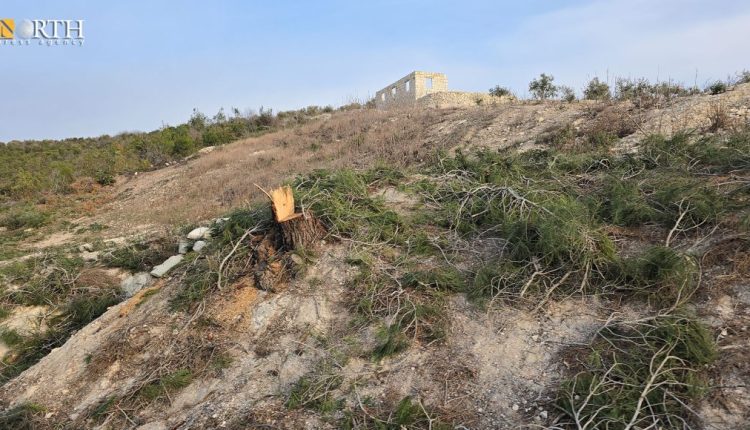
By Siwar Hamo
AFRIN, Syria (North Press) – The destruction of vegetation cover in Afrin region, northwestern Syria, continues, as once lush green hills and mountains have been transformed into barren landscapes due to systematic deforestation by Turkish-backed armed factions.
Since 2018, Afrin has been under Turkish control and the authority of affiliated armed factions, aka the Syrian National Army (SNA).
These violations persist at a time when displaced residents of Afrin had hoped to return home following the fall of al-Assad and the initiation of the political process in the country.
Systematic tree cutting
In the village of Haj Hassne in the west of Afrin, the surrounding hills and mountains were once densely covered with pine forests before 2018. However, through gradual and systematic tree-cutting operations, the area has been reduced to a barren wasteland, leaving only a few small shrubs.
Local sources from the village told North Press that SNA’s Samarkand faction led by Thair Maarouf, an Idlib native, has been actively cutting trees using electric saws.
For two months, militants of the faction have been hiring dozens of workers from camps on Mount Qazqli. The tree-cutting operations take place during the day, after which the felled trees are gathered, loaded onto large trucks, and transported to Afrin, Jindires, and Idlib—all in plain sight of security checkpoints along the roads.
Abu Juwan, a 44-year-old resident of a nearby village, said “Workers arrive early in the morning, accompanied by a few armed men, and begin cutting trees throughout the day. They then chop the logs into smaller pieces for easier transport.”
He added, “Before evening, large trucks arrive, and workers load them with three to four trailers full of logs each day. The trucks are then covered, and military vehicles escort them to their destination.”
According to Abu Juwan, armed militants were stationed around the area during the cutting and loading process to prevent anyone from interfering. “A week ago, they finished cutting all the trees in the area,” he said.
Another local resident, Abu Mohammad, 53, owns 150 olive trees near the deforested area. He saw dozens of workers cutting pine trees along the road between Haj Hassne and Kafr Safra while he was tending his land.
“There was a man in military uniform overseeing the operation. He would arrive daily from his headquarters in the nearby village of Rotanli. He appeared to be in charge of the workers, as he was present throughout the morning and left only after the logs were loaded,” Abu Mohammad explained.
He noted that the officer would personally transport one or two small trucks of logs to Rotanli, while the larger trucks, escorted by two military vehicles, one leading and one following, headed elsewhere.
Extortion
Late in 2024, local sources told North Press that the Samarkand faction had cut down hundreds of pine trees near Haj Hassne and transported them to Idlib for sale.
In another case of ongoing violations in Afrin’s countryside, militants of the Turkish-backed Hamza Division, also known as al-Hamzat, raided a home in the village of Sahra, in the Bulbul district, and seized the olive harvest belonging to Raafat Hussein. The raid took place in November 2024, shortly after Hussein had returned from harvesting his olive trees in the nearby village of Ali Karo.
The sources explained that the faction confiscated the harvest under the pretext that Hussein had not paid taxes on his 230 olive trees in Ali Karo. The faction had imposed a fee of $2 per tree on the village’s residents. The stolen olives were taken to the faction’s headquarters in the village of Shengal, in the Bulbul countryside.
Earlier, North Press published photos and videos showing trees that had been cut down with sharp tools. According to local sources, the Sultan Suleiman Shah Division (al-Amshat) faction felled more than a thousand pine trees in a forested area south of Mabata in Afrin’s countryside.
